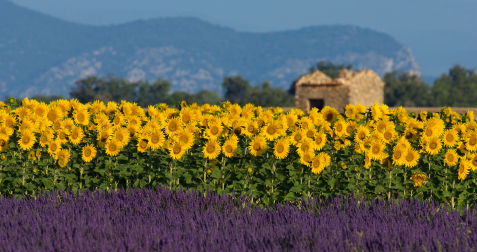
By Erin Jones
Do French Women Really Get Fat? I was thrilled to put this question to the test when I had the opportunity to truly observe Mireille in her element—as a guest at her home in Provence this summer. As a [secret] side project, I tracked my average weight for about a week before I left. It’s not that I didn’t trust the French woman’s philosophy; quite the opposite, actually. But I wanted to see if French women really don’t get fat. Before I tell you the outcome, let me tell you a little bit about my long weekend in the French countryside.
My breakfasts consisted of one fresh buttery croissant, which I purchased every morning from the local boulangerie, a small piece of fruit, a slice of gooey French cheese, coffee with whole milk and real sugar. Lunches were light, appropriate for the intense heat of the day; roasted chicken and fresh fruit from the market, or a salad niçoise, for example. The evenings were another story. Mireille carefully selected each decadent dinner menu, usually consisting of about five courses, each with champagne and wine, bien sûr. From truffle sauces to caramel soufflé to king crab mousse and escargot, I was having my doubts that I’d be able to maintain my equilibrium weight. Upon returning I couldn’t wait to get on the scale. The results? I lost 2 pounds.
After testing it a few more times to ensure accuracy and negate any “broken scale” theories, I began to realize something. I didn’t feel any heavier. No bloating, no signs of overindulgence in my jeans. Everything fit perfectly and I felt great, a far cry from how I usually feel after a mini vacation. (You know the feeling: sluggish and heavier than when you left home, mentally punishing yourself for that second ice cream cone or piña colada by the poolside.)
Making the French Connection
As I walked away from the scale, I wondered. Was it my daily walks to the market? My bike rides along the hilly Provençal roads? Sure, those helped, but they weren’t the only reason. How had I managed to maintain my healthy equilibrium, both mentally and physically? One word. Pleasure. While in Provence, I sought and received the same pleasure from my morning croissant as I did from my multi-course dinners prepared by a world-famous local chef. A handful of fresh ripe cherries from the outdoor market were as extraordinary and delectable as any chocolate cake I’ve ever had. Every mouthful of food I savored slowly, and appreciated immensely. This is a ritual we often forget to observe in our hectic daily lives.
And what a shame, because when food is fresh and prepared with care, the amount of pleasure you can derive from it is unimaginable. It’s easy to forget Brillat-Savarin’s sage words, you are what you eat….that is, until we fill our bodies with the highest quality food we can. Try it. I promise you won’t forget the feeling again. When we are good to our bodies, they are good to us. Our little indulgences keep us satisfied on the inside, and go less noticed on the outside.
Pleasures: Mandatory
As I reflect back on my trip, it has occurred to me: being a guest of Mireille is not a simple task. Enjoyable? Immeasurably. Pleasurable? You have no idea. But easy, no. You have to wake up every morning and prepare your senses for a complete and total makeover. The fresh fruits and veggies taste far superior to any you’ve ever tasted, the sunlight falls across the scenery in such a way you’d swear you’ve never seen a sunset before. The pace of life is gentler, the appreciation for life is palpable, and for only a few days, you forget a world outside Provence exists. Trust me, perfection can be jarring. You’ll find yourself inquiring, ‘Why don’t the strawberries taste like this at home?” and “How do they get the baguettes so perfectly crispy on the outside, yet soft in the middle?” and at other times, you’ll find yourself saying nothing at all. Perfection can be humbling.
This epiphany is what I like to call the Provence paradox. (Not too dissimilar from her sister, the French paradox.) Now that I’ve had a life-changing sensory makeover, how do I go back to life at home? Then suddenly, I see the answer clearly. The way we eat is illustrative of the way we live. Those who pause to put down their forks for a moment and admire their meals are often the same people who pause to admire a sunset. We must strive to be the type of person who stops to smell the roses, and the ratatouille. By seeking pleasure from all outlets, we cultivate pleasure within. I will value my thoughtfully prepared dinner at my kitchen table just as much as I appreciated my four-star dining experience with Mireille in Avignon. Whether shopping for exotic truffles or a simple tomato, I’ll search for the best quality I can find. In this mindset, I have truly brought Provence home with me.
